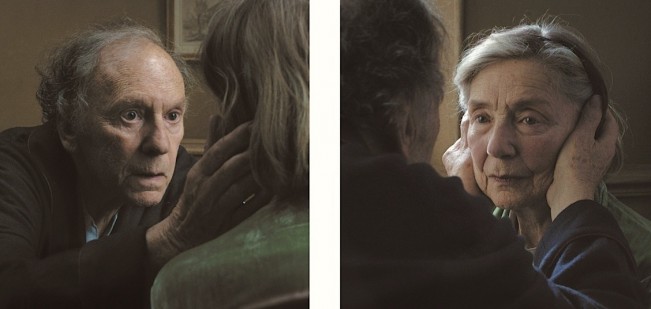By Jake Howell jake.howell@utoronto.ca
Cannes Competition review: Amour
To some demographics, Amour will feel long and slow, but that’s exactly what life is like for a retired married couple. Rest assured, because Michael Haneke’s latest is a quietly breathtaking film that looks at the devastating separation of soul-mates, and cinematic proof the characteristically cold director has a heart.
 Amour revolves around Anne (Emmanuelle Riva) and Georges (Jean-Louis Trintignant), who are acting out the final stages of their lives. When Anne falls suddenly ill, Georges begins to give palliative care to her as she loses more and more mobility in her failing body.
Amour revolves around Anne (Emmanuelle Riva) and Georges (Jean-Louis Trintignant), who are acting out the final stages of their lives. When Anne falls suddenly ill, Georges begins to give palliative care to her as she loses more and more mobility in her failing body.
Despite one specific dream sequence, Haneke’s signature shocks aren’t really apparent in Amour, and the director has instead opted for an unembellished approach. Combined with an unflinching camera and eschewing cinematic frills of any kind – non-diegetic music, for example – Haneke allows his film to be carried entirely by its legendary cast, and they absolutely succeed. The frame is simply a window into Georges and Anne’s exquisite apartment, with very little added to it. The film is formally very plain, but this isn’t a bad thing.
On a personal level, I should note that I can’t completely relate to Amour, because I am fortunate enough to have a relatively healthy family that has yet to really require hospice care. Knock on wood. Of course, this doesn’t reduce my enjoyment of the film, because the love story in Amour is powerful enough to break hearts with its tender beauty and polite contemplation. Amour is cathartic in many ways, but audiences who have experienced crippling health issues (or anything that has placed an incredible strain on a relationship) will be the most deeply touched.
http://www.youtube.com/watch?v=V89p9384fZs
Haneke’s career has been previously bleak, but Amour exhibits a brighter director. That said, Amour is a very sad story, but it’s clear that the meaning of the film is unequivocally positive about the human spirit and our commitment to loved ones. The connection between Georges and Anne is remarkably honest, which is mostly thanks to the masterful performances by Jean Louis Trintignant and Emmanuelle Riva. France is killing it in the acting game right now, and I can’t imagine these actors walking away from 2012 without a basketful of trophies.
As mentioned previously, there is only one scene that feels “Haneke” in Amour, so faithful followers of his work might not find what they’re looking for in his newest creation. Nevertheless, Amour is kind of extraordinary – it’s a beautiful, philosophical take on what love actually is, as well as an exploration of elder abuse and pity. Patience is absolutely essential to the consumption of Amour, because it reflects how one should act when interacting with the elderly. Audiences who give this film the time and respect it rightfully deserves will receive a beautifully human narrative, in addition to a broken heart.















